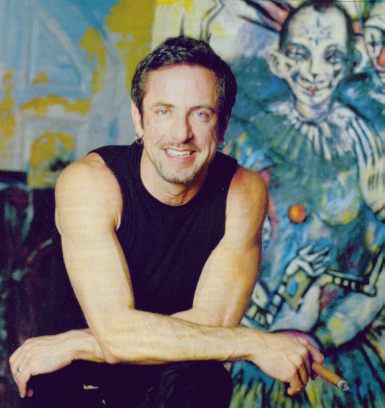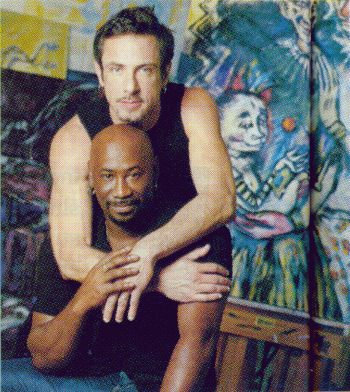
The many lives of Clive
taken from The Advocate January 18, 2000
to order a copy of this backissue go to www.advocate.com

The many lives of Clive
A new anthology of his writings shows just one side at the dashing and sinfully multitalented
Clive Barker By Christopher Landon
Winding up the sinuous streets of Beverly Hills, one wonders what awaits at the lair of Clive
Barker Severed heads impaled on iron stakes? Disemboweled corpses rotting before the massive doors of a gothic
Tudor mansion?
Well, not exactly. However, the gardens look lovely. Apparently the man who gave us Hellraiser loves flowers. In
fact, Barker's dwelling, which he shares with his photographer husband, David Armstrong, brims with color and light.
What's more, the maestro of horror has long since extended his creative horizons. Barker's evolution as an artist
is like one of those time-lapse movies where a day shoots by in seconds. Try as you might, you can't keep up. Born
in Liverpool, England, in 1952, son of an Italian mother and Irish father, Barker is not just a best-selling author
(Everville, Galilee) but also a film producer (Gods and Monsters, the upcoming gay and lesbian anthology Love and
Taboo), a screenwriter-director (Lord of Illusions, Hellraiser), a playwright, and a painter. At mid career he's
already produced a massive, almost unbelievably eclectic body of work. If you don't believe it, check out The Essential
Clive Barker (HarperCollins, $27.50), the classy new anthology due in stores this month.
But visit Barker's home, and he'll show you something newer. Inside his studio, covering almost every inch of space,
is Barker's next- project-The Book of Hours. Right now the Hours consists of hundreds of paintings that
will eventually be married to text for the finished story. It's a whimsical world of imagination intended, believe
it or not, for children, young and old,
Barker joins me to discuss this work in progress, the year in review, and how his past has created an entirely
unexpected future.
Landon: It's been quite a year for you. As a producer of the film Gods and Monsters, you must be very proud
of the project's critical success [it won The Oscar for Best Adapted Screenplay] and the accolades that followed
its release.
Barker: It feels great. There are very few experiences in my life as fulfilling as sitting in the Dorothy Chandler
Pavilion and looking at. Bill Condon proudly clutching that statuette for our little movie.
Your publishers sent me a very heavy book titled The Essential Clive Barker. How does it feel to see all that
work compiled in one book?
It. gives you that thing that all artists need at some point, a sense of achievement. The book had been proposed
at HarperCollins a while ago, and I had thought it would be simple to put together...
Wrong!
[Laughs] In January 1 took all the books, just David and myself, to Kauai. And I went through it all to
try and see what was essential. Of course, in your natural arrogance, you believe everything is essential. But
when you look at it, you see there are a lot of themes you return to because they answer some deep psychological
need. So I was able to see thematic material.
In your introduction to the Books of Blood anthologies, you mention that the Clive Barker who spun tales of
blood and gore is dead and buried.
I think that. it is very important that we as artists accept that your voice changes. What I've learned at the
age of 47 is that many of the things I did not like about the work from an earlier time... I look back and think,
Jeez, I fucked up that one, didn't I? But sometimes it's really just about putting it out there, I think
it's important to be at peace with that. So when I look at The Essential Clive Barker, I look at a lot of work
that is very remote from who I am now but; also feels, in the nicest way, like a sort of memory of some other fellow
I knew once and liked in some ways and disliked in other ways.
Do you miss him?
No. And one reason I don't is because he wrote those stories and served his purpose. Part of what allows me to
move on is to look back and say, "I enjoyed that, but I don't want to do that anymore…" I'm infinitely
happier than that dark, brooding, and sometimes lonely fellow.
There has always been this wonderful gray area in your work. Nothing is ever black and white. In some cases
you've managed to transcend things like gender through your characters.
Gender ambiguity fascinates me. Any hint of sexual ambiguity fascinates me. The ambiguities of desire are infinitely
more interesting than nice, moral passages.
It seems you've always thrived on the taboo and on challenging the finger shakers who say, "Don't."
A lot of gay people have faced that their entire lives-people telling them, "You can't do that." Once
you survive the experience of being told no or being told that what comes naturally to you is, by their definition,
unnatural-something happens in you that is wonderful. It forces you to work on anew definition for what is natural.
And when you start to reassess yourself, you begin to reassess those who tell you "Thou shalt not." And
when you do that, you start to reassess the whole fucking culture. And that's a wonderful place to be. William
Blake said, "Make your own laws, or be a slave to another man's."
Homophobia is not going anywhere. It might go underground, hut it isn't going to disappear. It is in our nature
to hate otherness. The question is, Are we made stronger by being other, or are we weakened as individuals by being
other? My argument is that if we can stand up for the right to be other-and maybe that means being excluded from
a party that isn't very much fun anyway-then we are strong.
 |
You rock [Barker laughs]. So now the obligatory "juicy" question: Where did you meet your husband,
David?
At the Faultline [bar in Los Angeles]. I stole his parking place [smiles brightly].
You're so happy. You make me sick. How did the whole idea of getting married come about?
I discovered that I wanted to spend the rest of my life with David. Knowing that we couldn't do things legally,
we exchanged rings and private vows. It's really between David, myself, and God. I don't want to be a copy of any
heterosexual model. On the other hand, I want to be able to say I am devoted to this person, David, and will make
as strong a sign of that as possible under the law. I think that's fair and right.
Photos by Michelle A.H. Smith for The Advocate
Disclaimer: This page was created for the purpose of enjoyment and education. It is not our intent to infringe
upon copyrights or trademarks. Alterations will be made upon request.